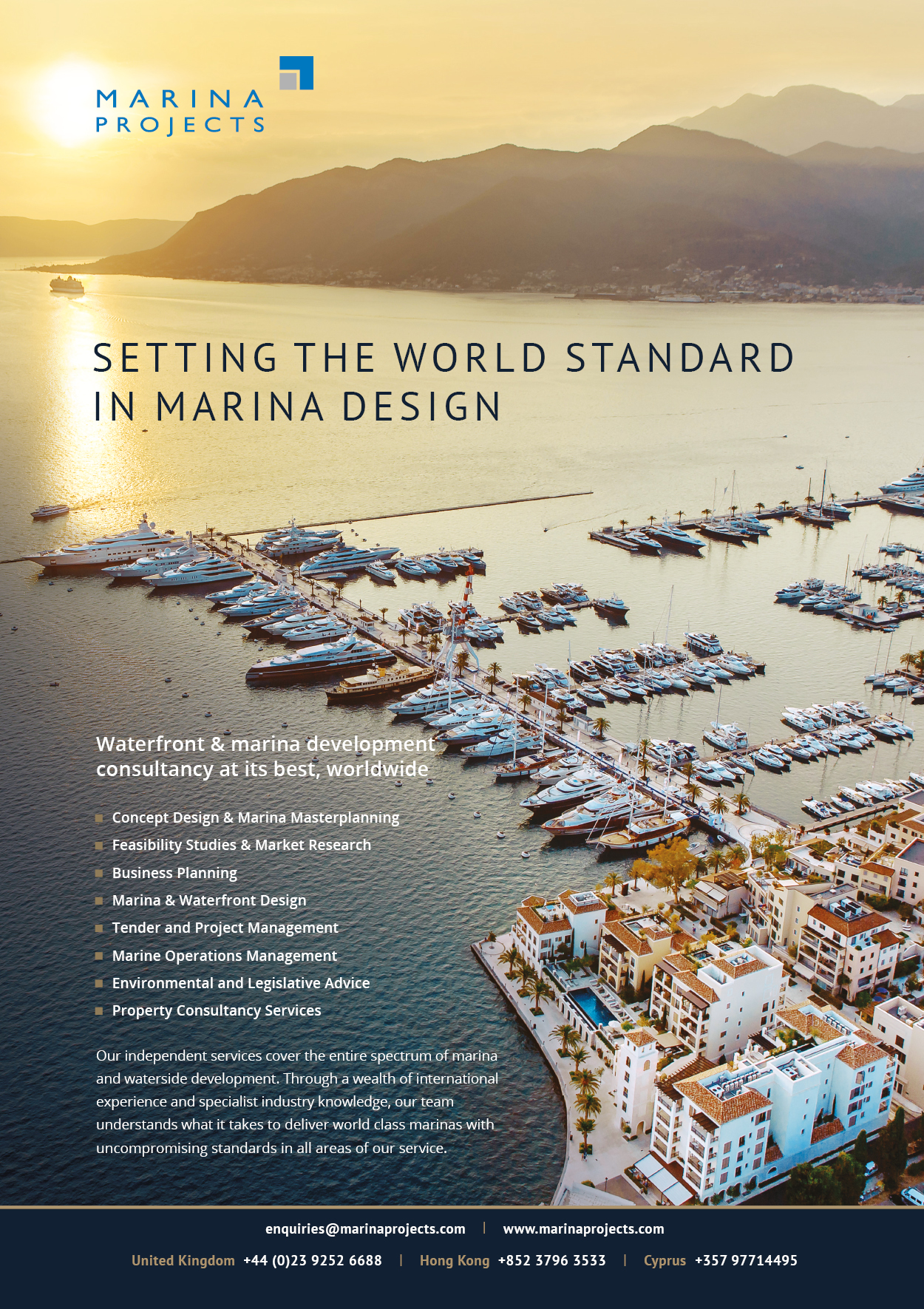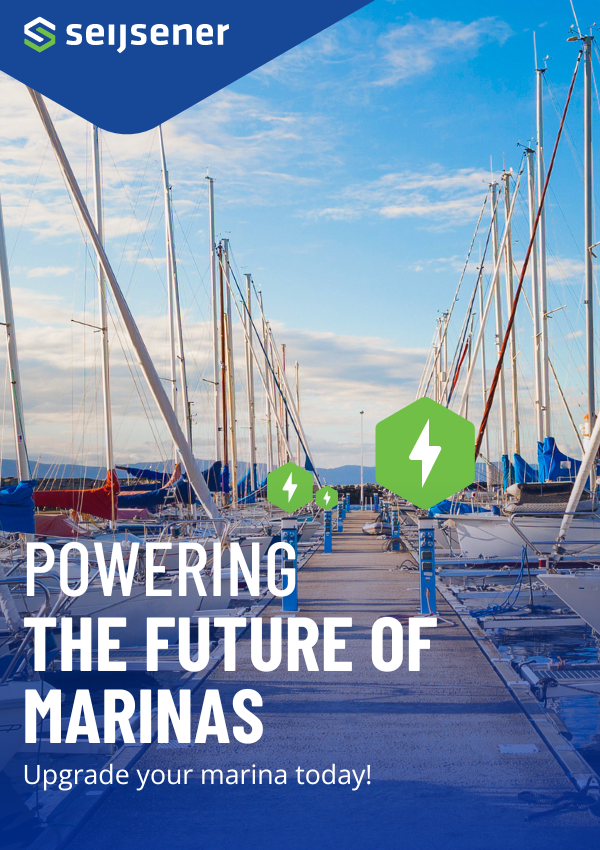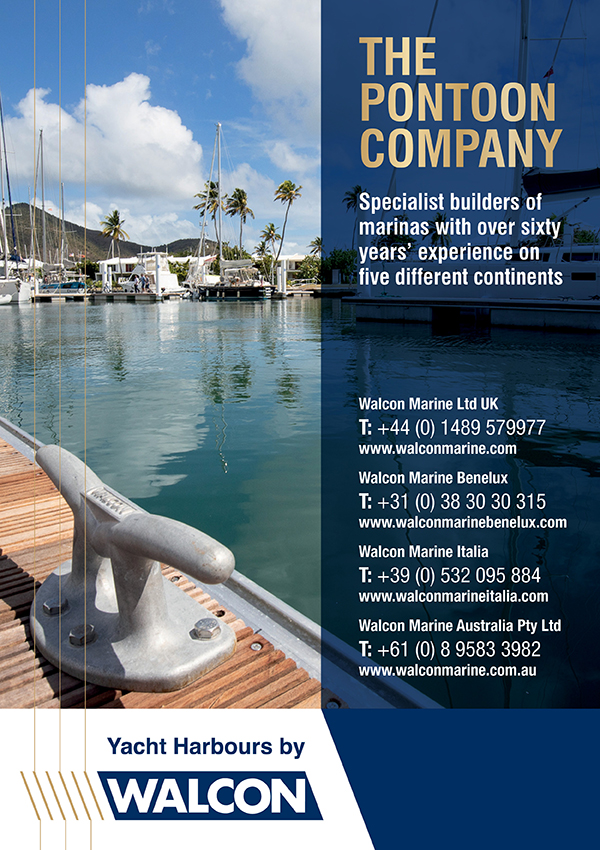Adapting marinas to alternative fuel propulsion systems
by Ian Dobson and Esteban Biondi
Climate change mitigation requires widespread changes to reduce green house gas (GHG) emissions, including changes to recreational navigation energy sources. Some of the questions being asked across the sector include: What does the future look like? How do marinas need to respond? When do I need to act? PIANC RecCom working group 217 is drafting technical guidance for the adaptation of marina infrastructure to support the energy transition of the recreational navigation industry.
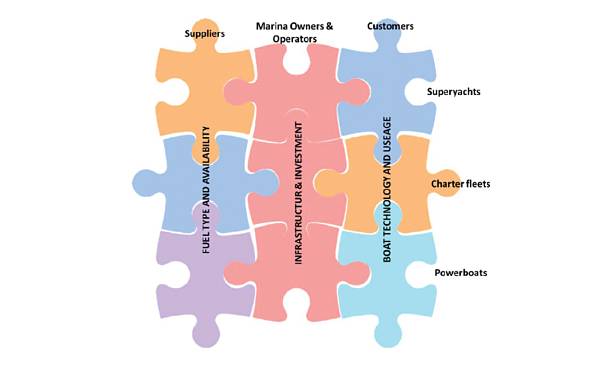
Front and centre to the question of adaptation is the need to understand which fuel propulsion systems will be used by recreational watercraft in a decarbonised future. The range of theoretical alternative fuels available for recreational boating activities is varied, but very few are being implemented at scale. Potential fuel sources include electric engines, synthetic liquid fuels (for internal combustion engines), hydrogen (fuel cell and combustion), methanol, and hybrid combinations thereof.
Whilst electrical supply systems are already commonplace in marinas, significant changes are required to address the needs for battery charging for primary propulsion systems. For each type of solution, the supply chain of the energy source and the availability of vessels will determine the marina requirements.
Which fuel will win?
The sustainable propulsion system of choice for recreational vessels will drive the demand for marina adaptation.
Recreational navigation propulsion systems continue to evolve as powertrains and fuel technology provide more advanced solutions. The automotive industry was thought to be a reference for technology development, but boats significantly differ from cars. The increased mass of fuel systems in vessels creates a disproportionate amount of drag increasing fuel consumption, the impacts of autonomy changes are more significant in marine environments, and the use patterns of private vessels are very different from private cars. ICOMIA evaluated the GHG life cycle emissions of alternative propulsion systems in its recent report on Pathways to Propulsion Decarbonisation for the Recreational Marine Industry (see p.27), concluding that “the diversity of the recreational marine industry means environmental sustainability and decarbonisation initiatives cannot take a one-size-fits-all approach related to propulsion technologies.”

Next to the market, and in early roll-out, are the hydrogen-electric hybrids, most of which will utilise a hydrogen fuel cell to provide electric power. There is also much development in the world of commercial shipping, with solutions under development that include hydrogen, ammonia and methanol. These types of solutions are presently considered the alternative pathways to providing non-fossil fuel propulsion to superyachts, even if the 37th America’s Cup will showcase the introduction of hydrogen fuel cell chase boats.

Since there is a vast fleet of recreational vessels with internal combustion engines that cannot easily be replaced, synthetic drop-in fuels (often labelled ‘transition fuels’ as they are unlikely to be carbon zero) are likely to provide a valuable interim solution to the wider market in the near term. However, the ICOMIA report highlights that the life cycle emissions of the most carbon-efficient drop-in fuels can be lower than alternative propulsion systems with low usage, due to the emissions embodied in the mining and fabrication of the propulsion system itself.
If you think that it is ‘too early to say’ or it ‘remains unclear’ which fuel will win the race to replace fossil fuels, you might be providing the right answer to the wrong question. There is already consensus that the industry will require an array of solutions to meet the wide-ranging needs of the customer and the medium-term landscape will require infrastructure to support an array of fuelling systems.
Future-proofing infrastructure
The challenge for the marina owner and operator is digesting this changing landscape and coming to informed business decisions on how to invest in assets whilst meeting customer expectations and achieving carbon emission targets (internal or regulatory). From an institutional and industry perspective, PIANC RecCom intends to create the conditions for marina adaptation so that marina facilities do not become a bottleneck in the decarbonisation process of the recreational navigation industry.
The traditional fuel berth is the most obvious piece of infrastructure to review. It is highly likely that the berth will need to cater for the dispensing of an increased number of liquid fuel types. Synthetic drop-in liquid fuels, which can be stored in traditional tanks, are the most straightforward to adapt to, but a wider variety of fuel storage and dispensing systems may need to be available.
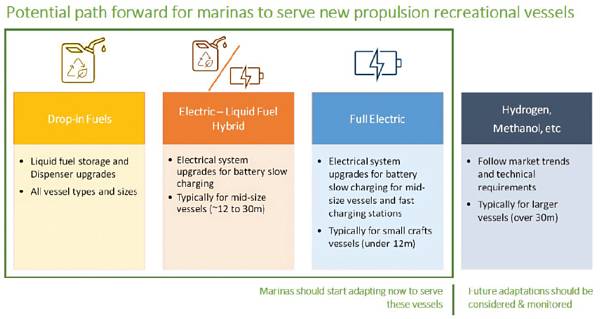
This problem of available electrical energy supply becomes increasingly more problematic where super-fast chargers are provided (anywhere between 7kW and 22kW) for electric boats, in addition to car chargers in the car park. The mix of super-fast chargers to drip charges should be assessed based on the customer mix, but also in the context of what the local power grid can support.
The storage and delivery of hydrogen will require more complex systems for pressurised storage and dispensing. However, aside from capital investment in specialist equipment, operators also face a huge impact on space requirements. Larger fuel berths will be required, with associated landside storage and access space that will absorb commercial space. Infrastructure requirements for methanol may be less demanding than hydrogen, but there are still details to be worked out.
New propulsion systems in the recreational navigation industry will require a mix of infrastructure adaptations in marinas. Different marinas will have to respond to different emerging demands, depending on vessel sizes, user profiles and environmental conditions. Significant investments will be required over time, so careful analysis and planning will be required. Whilst there are many questions to be answered, PIANC RecCom intends to lay out the fundamental principles with the working group 217 upcoming report and develop more detailed guidance as needed in the future.
Ian Dobson, managing director of TILT Engineering Design, is a member of the PIANC Recreational Commission and is chair of the Working Group titled – The impact of Alternative Fuel Vessels on Marina Design and Management. Esteban Biondi, principal at Applied Technology & Management, is chair of the PIANC Recreational Commission.

